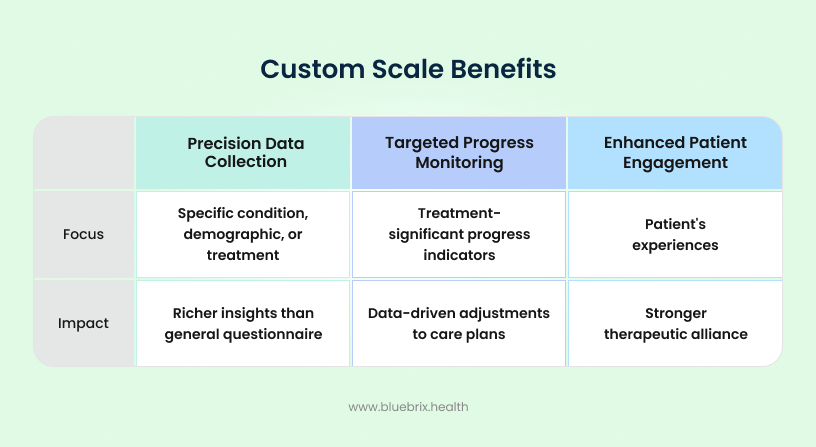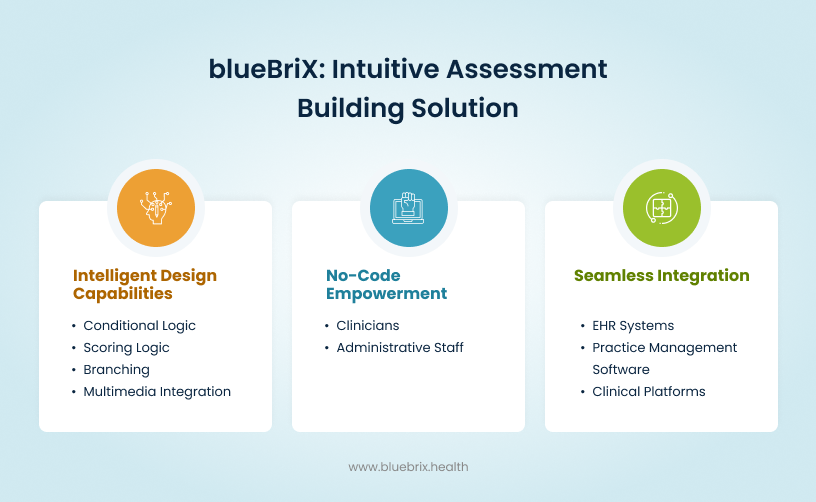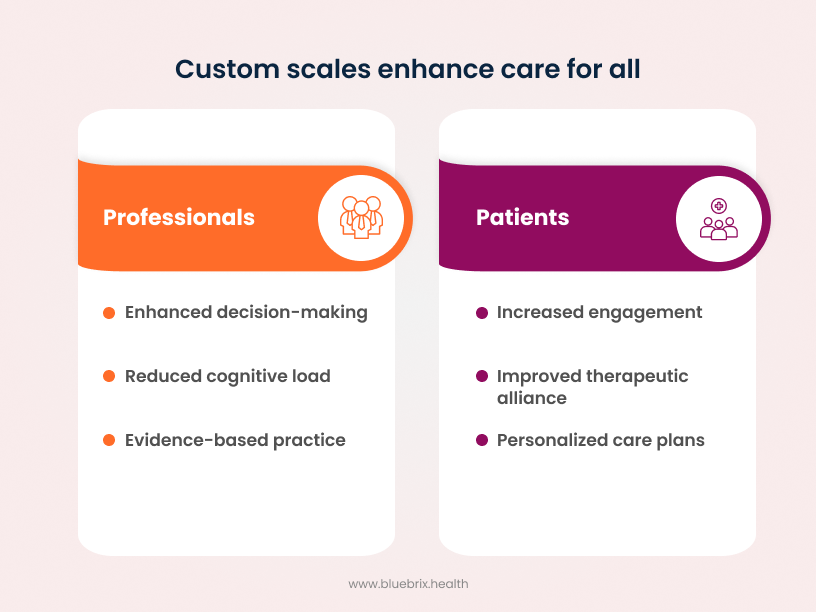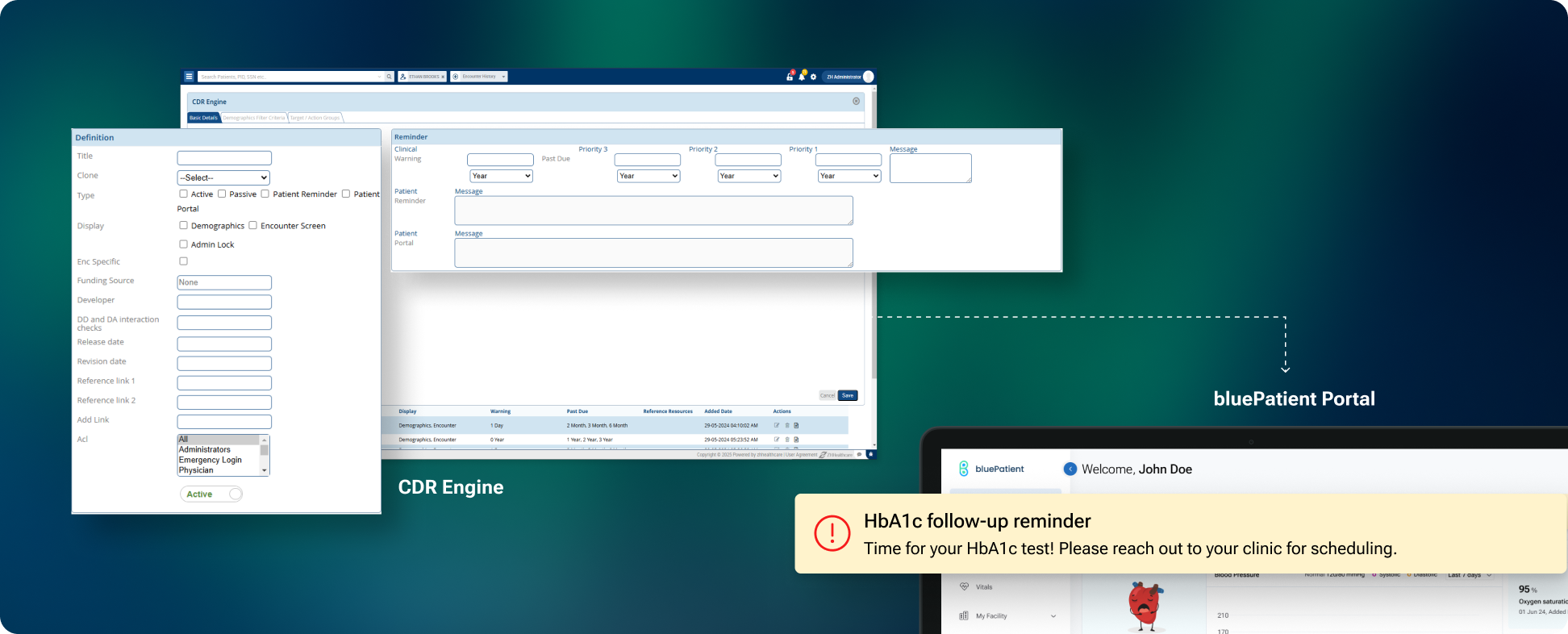Many behavioral health practices still rely on generic assessment forms that don’t quite fit the needs of the patients they serve. These off-the-shelf forms might cover the basics, but they often tend to miss the nuanced symptoms, behaviors, or needs specific to different populations. When clinicians have to work around forms that don’t align with their treatment approach, it not only wastes time, but can negatively impact the quality of the data collected.
The silent crisis in behavioral health: why standard forms fall short
In behavioral health, the treatment’s efficacy depends significantly on accurate and timely assessments. Yet, a pervasive challenge persists: the widespread reliance on generic, “one-size-fits-all” assessment forms. These off-the-shelf templates, while seemingly convenient, often create more problems than they solve.
A one-size-fits-all form can lead to answers that are too broad, too vague, or simply irrelevant. Important details may never get captured because the form didn’t ask the right question in the right way. That leads to gaps in insight, slower diagnoses, and more work chasing clarity through additional follow-up.
These inefficiencies add up fast. Time is lost reviewing irrelevant data, clarifying answers, or manually adjusting documents. For busy practices, those small delays add up into weeks of administrative effort over the course of a year. And that is before factoring in the cost of training, staff turnover, or inconsistent usage.
Why common forms miss the mark:
- Irrelevance and misalignment: Standard forms are designed for broad application, often failing to capture the unique nuances of an individual’s condition, cultural background, or specific therapeutic goals. For instance, a generic depression scale might not adequately assess the unique presentation of depression in an adolescent dealing with cyberbullying, or in an elderly patient experiencing social isolation.
- The “information void”: When questions don’t resonate, patients may provide vague or incomplete answers, leading to critical information gaps. Imagine a clinician trying to understand the specific triggers for panic attacks in a patient using a form that only asks about “general anxiety.” The rich, actionable details are lost.
- Data quality compromise: The data collected from ill-fitting forms can be misleading or insufficient, impacting diagnostic accuracy and treatment planning. A study by the American Psychological Association found that inaccurate or incomplete patient data can lead to suboptimal care outcomes and increased healthcare costs.
The hidden cost of inflexibility
Beyond the clinical implications, relying on rigid forms exacts a heavy toll on practice efficiency and finances.
- Time sink: Clinicians spend invaluable hours adapting generic forms, manually inputting data, or conducting follow-up interviews to gather missing information. A recent survey of mental health professionals indicated that over 30% of their administrative time is spent on documentation and paperwork, much of which involves working around inflexible systems. This translates to less time for direct patient care.
- Operational inefficiencies: These small, recurring delays snowball. For a practice seeing dozens of patients a week, these “minor” inefficiencies can accumulate to weeks of lost administrative effort annually. This doesn’t even account for the financial drain of staff training on complex workarounds, higher turnover due to burnout, or the inherent risks of inconsistent data usage.
Unlocking precision: what are custom rating scales? (and why they're better)
Imagine an assessment tool meticulously crafted to echo the unique narrative of each patient and the specific therapeutic approach of your practice. That’s the power of custom rating scales. These are not merely generic templates; they are bespoke assessment instruments designed by providers themselves, reflecting their patient populations, treatment methodologies, and desired clinical outcomes.
Instead of forcing patients to fit into the structure of a rigid template, custom scales allow providers to define the structure around the patient. This flexibility leads to better outcomes on both sides of the relationship. Providers can gather data that’s specific to the condition being treated, track treatment-significant progress metrics, and avoid irrelevant clutter. Patients, in turn, get questions that are relevant to them; questions that actually reflect their experiences, rather than broad checklists pulled from generic sources.
When clinicians get the specific information they need, they can make faster, more informed decisions; symptoms are tracked more accurately; changes in behavior or response to treatment are captured in a way that makes clinical sense. Over time, this translates into clearer care plans and better continuity.

Example in Action:
Consider a dialectical behavior therapy (DBT) program. A standard intake form might ask about general mood. A custom rating scale, however, could include specific questions on emotional regulation skills usage (e.g., “How often did you use a distress tolerance skill this week?”), interpersonal effectiveness (e.g., “Rate your ability to assert your needs in difficult conversations”), or mindfulness practice frequency, directly aligning with DBT principles and allowing for precise tracking of skill acquisition and application.
Meet blueBriX: Your intuitive assessment building solution
The notion of building custom forms might sound daunting, evoking images of complex coding or expensive IT consultants. blueBriX shatters this misconception, empowering behavioral health providers to design their own assessment tools with unprecedented ease. blueBriX lets behavioral health providers create their own custom forms without needing any technical skills. The platform uses a simple drag-and-drop interface, so clinicians and administrative staff can build or adjust their own custom forms and rating scales quickly.
You can easily structure questions, define scoring logic, and set up advanced formats for branching, multi-part questions, or conditional logic. This means even complex assessments can be built without involving an IT team. And because blueBriX integrates with your existing systems seamlessly, the data flows exactly where it needs to go; there’s no duplicate entries and no extra spreadsheets. Whether you’re measuring anxiety symptoms, substance use behaviors, or social functioning in a specific demographic, blueBriX makes it easy to tailor assessments to the way your team works.

Key features for effortless customization:
- No-code empowerment: blueBriX operates on an intuitive, drag-and-drop interface, eliminating the need for any technical expertise. If you can use a computer, you can build a form. This democratizes form creation, allowing clinicians and administrative staff to take ownership of their assessment tools.
- Intelligent design capabilities: Beyond simple question types, blueBriX offers sophisticated features for complex assessment design. This includes:
- Conditional logic: Questions appear or disappear based on previous answers (e.g., “If patient answers ‘yes’ to suicidal ideation, then prompt with follow-up questions on safety planning”).
- Scoring logic: Automate the calculation of total scores or subscale scores, instantly generating insights without manual computation.
- Branching: Guide patients through different pathways based on their responses, ensuring only relevant questions are presented.
- Multimedia integration: Include images, videos, or audio prompts to enhance the clarity and engagement of your assessments.
- Seamless integration: blueBriX is designed to be a complementary tool, integrating effortlessly with your existing electronic health record (EHR) systems, practice management software, and other clinical platforms. This ensures data flows smoothly, eliminating duplicate entries, reducing manual errors, and maintaining data integrity across your entire workflow.
The ROI of customization: saving weeks of time and upto 90% in Costs
The true financial burden of outdated, rigid assessment forms often goes unrecognized. It’s not just about paper costs; it’s about the cumulative impact on productivity, staff morale, and ultimately, patient care.
Quantifying the savings:
- Time reclaimed: Our clients consistently report saving 1-2 weeks of administrative work per year by transitioning from manual or generic forms to automated, custom solutions with blueBriX. This isn’t just theory; this is observed, quantifiable time saved that can be reallocated to direct patient care, professional development, or reducing clinician burnout.
- Dramatic cost reduction: The hidden costs of external development, vendor reliance, and ongoing customization for generic systems can be astronomical. By empowering practices to build in-house, blueBriX facilitates up to 90% cost savings compared to outsourcing form development or paying exorbitant fees for custom modifications to off-the-shelf software. Consider a small practice paying $5,000 annually for custom form development; with blueBriX that cost could drop to just a few hundred dollars.
- Enhanced clinician capacity: When clinicians are freed from burdensome administrative tasks, they gain valuable time. This regained capacity directly translates to:
- Increased patient load: Potentially seeing more patients, improving access to care.
- Deeper engagement: More time for therapeutic interventions and personalized support.
- Reduced burnout: A significant factor in retaining skilled professionals in a demanding field. According to a Medscape report, clinician burnout rates are alarmingly high, impacting patient safety and quality of care. Tools that streamline workflows directly combat this issue.
Beyond efficiency: better outcomes for patients and professionals
The benefits of custom rating scales extend far beyond operational efficiencies, creating a virtuous cycle that profoundly impacts both patients and the professionals dedicated to their well-being.
For professionals: precision in practice
Clinicians are empowered with data that truly matters, leading to:
- Enhanced clinical decision-making: With targeted data, clinicians can make faster, more informed decisions regarding diagnoses, treatment adjustments, and progress evaluations. No more sifting through irrelevant information.
- Reduced cognitive load: The clarity and relevance of custom data reduce the mental effort required to interpret assessments, allowing clinicians to focus their energy on patient interaction and therapeutic strategy.
- Evidence-based practice: Custom scales enable practices to collect data that supports their unique interventions, contributing to a more robust, evidence-based approach to care.
For patients: the power of being understood
When assessment questions are tailored to their specific experiences and concerns, patients feel genuinely heard and validated. This fosters:
- Increased engagement: Patients are more likely to complete forms thoroughly and honestly when they perceive the relevance of the questions. This leads to richer, more accurate data.
- Improved therapeutic alliance: Feeling understood strengthens the bond with their provider, which is a powerful predictor of successful treatment outcomes.
- Personalized care plans: Data derived from highly relevant questions enables clinicians to craft more precise, individualized treatment plans, directly addressing the patient’s unique challenges.

A real-world example: supporting veterans’ mental health
Imagine a behavioral health practice specializing in supporting veterans. Instead of relying on a generic trauma assessment, they use blueBriX to create a highly specific, custom scale tailored to the unique presentations of PTSD in military personnel, perhaps including items related to combat exposure, moral injury, or military sexual trauma. Within weeks of implementing this custom scale, their team observes:
- More consistent documentation: Standardized, yet personalized, data collection.
- Faster session preparation: Clinicians quickly identify key areas to address based on highly relevant assessment results.
- Richer treatment planning: The ability to pinpoint specific triggers and symptoms leads to more patient-specific interventions, significantly improving outcomes for veterans. This proactive and tailored approach demonstrates a deeper level of care and understanding.




